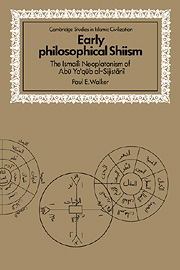Book contents
- Frontmatter
- Contents
- Preface
- Acknowledgments
- Note on transliteration
- List of abbreviations
- PART I AL-SIJISTĀNĪ'S HERITAGE
- PART II AL-SIJISTĀNĪ'S UNIVERSE
- 4 Introduction: categories of thought and terms of analysis
- 5 A theology of unqualified transcendence
- 6 Creation as command
- 7 Intellect, the sum of existent being
- 8 Descending and ascending soul
- 9 Nature and the physical realm
- 10 A cosmic anthropology
- 11 Prophecy, the deputy of intellect
- 12 Interpretation and its institution
- 13 Salvation and the womb of history
- EPILOGUE: THE USE AND CONTROL OF REASON
- Notes
- Select bibliography
- Index
7 - Intellect, the sum of existent being
Published online by Cambridge University Press: 02 November 2009
- Frontmatter
- Contents
- Preface
- Acknowledgments
- Note on transliteration
- List of abbreviations
- PART I AL-SIJISTĀNĪ'S HERITAGE
- PART II AL-SIJISTĀNĪ'S UNIVERSE
- 4 Introduction: categories of thought and terms of analysis
- 5 A theology of unqualified transcendence
- 6 Creation as command
- 7 Intellect, the sum of existent being
- 8 Descending and ascending soul
- 9 Nature and the physical realm
- 10 A cosmic anthropology
- 11 Prophecy, the deputy of intellect
- 12 Interpretation and its institution
- 13 Salvation and the womb of history
- EPILOGUE: THE USE AND CONTROL OF REASON
- Notes
- Select bibliography
- Index
Summary
To understand properly al-Sijistānī's doctrine concerning intellect, it is essential to approach it from two ostensibly different aspects. On the one hand, intellect – ‘aql in Arabic – is an angelic, hypostatic being standing at the absolute summit of creation (but, of course, not outside it). As the first “originated being,” al-mubda‘ al-awwal, and the first created being, intellect is the sum of all existents.
In this sense al-Sijistānī is an orthodox Neoplatonist. Most of Plotinus' teaching about intellect – nous in Greek – finds an echo in his writings. What begins to reveal a deviation from this tradition is his use of a special term for this primordial universal intellect. In Arabic it is al-sābiq – an unusual word which requires a technical term in English translation such as “the Preceder.” That in any case is the word used throughout this study for this special Arabic term. As a name for intellect, it does not occur in the Arabic Plotinian materials and it is as yet of an unknown origin outside of the Ismaili da ‘wa where, however, it is standard. Nevertheless, its meaning is relatively clear since it is one of a pair which always includes al-tālī or the Follower, and which is another way of referring to universal soul – that is, the universal form of soul.
The other aspect of intellect is its individual and particular representation in the human being.
- Type
- Chapter
- Information
- Early Philosophical ShiismThe Isma'ili Neoplatonism of Abu Ya'qub al-Sijistani, pp. 87 - 94Publisher: Cambridge University PressPrint publication year: 1993

